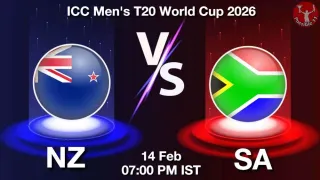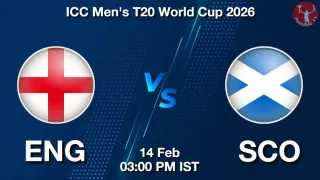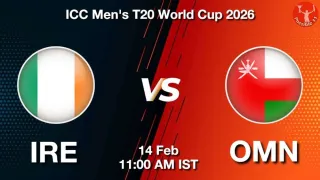On November 8, 1987, one of the greatest chapters in cricket history was written when Australia lifted their first-ever Cricket World Cup trophy. Played at the iconic Eden Gardens in Kolkata, the 1987 World Cup final marked a pivotal moment in the annals of cricket. Under the leadership of Allan Border, Australia triumphed over England in a thrilling encounter, winning by a mere seven runs. This victory marked the beginning of Australia’s dominance in world cricket, setting the stage for their eventual rise to become one of the most successful teams in the sport's history.
Australia's First World Cup Win
Before 1987, Australia had never won the prestigious ODI World Cup. Despite being a cricketing powerhouse, the team had come close in previous tournaments but never clinched the ultimate prize. However, under Allan Border's leadership, Australia was determined to end that drought. The final was held at Eden Gardens, Kolkata, one of the most revered cricket stadiums in the world, which added an extra layer of excitement to the event.

Image Source: Twitter
The Toss and Australia's Batting Performance in the 1987 Final
On the day of the final, Allan Border won the toss and chose to bat first, a decision that proved to be both bold and effective. Batting on a wicket that was expected to slow down, Australia set a competitive target. The Aussie batsmen put together a solid innings, posting a total of 253 runs for the loss of five wickets in their allotted 50 overs.
The standout performer for Australia was the opening batsman, David Boon. Boon played a patient yet assertive knock, scoring 75 runs off 125 balls. His innings formed the backbone of Australia’s total, with several other players chipping in to support him.
Mike Veletta, a key middle-order batsman, played a crucial role, finishing unbeaten on 45 runs from 31 balls. His quickfire knock at the end of the innings helped Australia post a defendable total.
England’s bowling attack, led by Eddie Hemmings, made inroads. Hemmings was the pick of the bowlers for England, claiming two wickets in the final, but he could not prevent Australia from setting a challenging target.
England’s Chase
As the match entered the second innings, England’s chase was off to a rocky start. Opening batsman Tim Robinson was dismissed for a duck, and the early pressure began to mount on the English team.
However, England’s experienced batsmen, particularly Graham Gooch, tried to steady the ship. Gooch’s knock of 35 runs from 57 balls provided some hope for England, but when he fell, the pressure was once again on the middle order.
Bill Athey emerged as England’s highest scorer in the final. Athey played a composed innings, scoring 58 runs off 103 balls. Although his contribution was valuable, he could not convert it into a match-winning knock.
England’s skipper, Mike Gatting, also looked in good form, contributing 41 runs off 45 balls. But despite the efforts of Athey and Gatting, England’s chase lacked the firepower needed to reach the target. Both Gatting and Allan Lamb (who fell short of a half-century, scoring 45 off 51 balls) contributed valuable runs but could not provide the necessary finishing touch.
Australia's Winning Bowling Attack in the 1987 Final

Image Source: Twitter
In the end, it was Australia’s disciplined bowling that sealed the victory. Despite England’s best efforts, they fell short of the target, finishing their 50 overs with 246 runs. Australia had won by a mere seven runs in a thrilling finale.
The Australian bowlers were exceptional under pressure, with Steve Waugh and captain Allan Border leading the charge. Both Waugh and Border claimed two wickets each, providing crucial breakthroughs when it mattered most. Waugh’s spell, in particular, was vital in restricting England’s middle order, while Border’s leadership was instrumental in maintaining the team's composure during the tense moments of the game.
Australia's 1987 Cricket World Cup Victory
Australia’s victory in the 1987 World Cup remains one of the most memorable moments in the history of the tournament. It not only ended the country’s long wait for a World Cup title but also signalled the start of a new era of Australian dominance in cricket.
Since 1987, Australia has won the World Cup a further five times (in 1999, 2003, 2007, 2015, and 2023), making them the most successful team in the history of the tournament. The 1987 victory, however, holds a special place in the hearts of Australian fans, as it laid the foundation for what would become a period of sustained excellence in world cricket.
Allan Border, who captained the team, is widely regarded as one of the game's great leaders, and his calm yet determined approach to the game inspired a generation of cricketers. The 1987 World Cup final also marked the emergence of several key players in Australian cricket, including David Boon, who would go on to become one of the nation's most respected batsmen.
1987 Cricket World Cup Final
In conclusion, November 8, 1987, is a day that will forever be etched in cricketing history. Australia’s first-ever World Cup title changed the landscape of international cricket, and the win over England at Eden Gardens set the stage for what would become an era of dominance by the Australian cricket team. The 1987 World Cup not only demonstrated Australia’s resilience but also showcased the team's depth, skill, and strategic thinking, qualities that would define their success for decades to come.
Also Read: Top 3 Stadiums Hosting the Most International Cricket Matches


Disclaimer
Possible11 is a sports news and analysis platform designed purely for entertainment and educational purposes. All match previews, player insights, and team analyses are based on publicly available information and expert opinions. We do not promote or support betting, gambling, or real-money gaming in any form. Users are encouraged to enjoy our content responsibly and use it for informational purposes only.






















Give Your Feedback